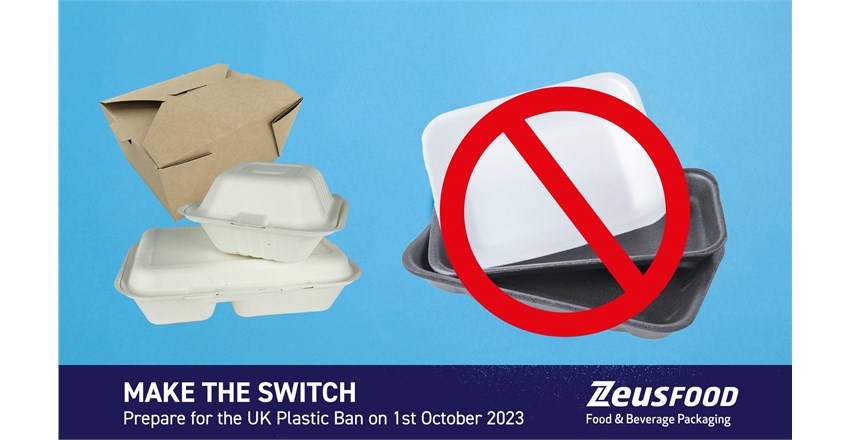The UK Single-Use Plastics Ban is approaching, prompting a re-evaluation of your on-the-go packaging choices.
Published date: 29/09/2023 08:42

Understanding Expanded Polystyrene (EPS)
You might commonly refer to it as Styrofoam, but Styrofoam is merely a brand of expanded polystyrene (EPS), much like Hoover is synonymous with vacuum cleaners. EPS is a lightweight material often used for coffee cups and take-away trays, known for its characteristic white or yellow appearance.
Versatility in Application
EPS excels in providing lightweight insulation, making it a prevalent material in the foodservice industry. Whether it's serving piping hot coffee in an EPS cup or keeping your to-go meals warm or cold, this material effectively maintains temperature while preventing heat-related accidents. Moreover, its mouldable nature allows for versatile container designs in various shapes and sizes.
The Environmental Impact
Polystyrene, unfortunately, doesn't meet eco-friendly standards, leading many countries to impose bans on EPS products. As consumers and industries advocate against these materials, the quest for genuine and sustainable alternatives gains momentum, with the aim of eradicating polystyrene from the foodservice sector.
EPS, often mistakenly believed to be biodegradable or recyclable, falls short in terms of eco-friendliness. While it may break down under high temperatures, it leaves behind harmful microplastics that negatively impact both wildlife and humans. Recycling EPS is possible but expensive, with most local recycling facilities lacking the necessary equipment. Furthermore, recycled EPS cannot be used in the foodservice industry, undermining the purpose of recycling. To compound matters, EPS is derived from non-renewable fossil fuels and synthetic chemicals, further contributing to pollution.
The UK Single-Use Plastics Ban: An Overview
Starting in October 2023, the UK Government is enacting new legislation to ban certain single-use plastics. This initiative aims to reduce plastic waste and litter, aligning with the EU directive signed in 2019, which set clear targets for reducing plastic consumption across Europe by 2025. It's also in line with the UK's 25-Year Environment Plan, which seeks to eliminate all avoidable plastic waste by 2042. Plastic pollution poses a long-lasting threat to the environment, taking centuries to decompose and emitting greenhouse gases throughout its lifecycle.
Why EPS Falls Under the UK Single-Use Plastic Ban
For products to be included in the ban, they must satisfy the UK's definitions for polystyrene. Specifically, they must undergo a foaming process during manufacture. Expanded Polystyrene (EPS) falls within this scope based on its production process.
Impact on the Food Service Industry
Foodservice operators should act promptly to reduce their stock of banned products before the October deadline. To continue offering takeout services, they must seek and budget for alternative materials that comply with the ban. Embracing sustainable options is not just a regulatory requirement but also a responsible step toward a greener future.
Are there suitable alternatives?
Absolutely, there are alternatives that can match the performance of EPS while being more environmentally friendly. Whether you're looking for recyclable or compostable options, here are some excellent alternatives:
- Stylish Recyclable Black Food Trays: These trays are not only visually appealing but also recyclable. They provide a sleek and modern look while effectively containing food items. They are a great choice for both hot and cold dishes.
- Robust Multi-Functional Leakproof Kraft Boxes: Available in various sizes, these kraft boxes are versatile and durable. They can handle a wide range of food items without leaking or compromising on freshness. The leakproof feature ensures that your customers receive their meals in perfect condition.
- Compostable Bagasse Clamshells: Bagasse is a sustainable material made from sugarcane pulp. Clamshells made from bagasse are an excellent alternative to EPS containers. They are compostable, meaning they can be broken down into natural elements without leaving harmful residues. These clamshells are sturdy and ideal for various food items.
Choosing these alternatives not only aligns with the growing demand for eco-friendly packaging but also demonstrates a commitment to reducing your environmental footprint. By opting for recyclable or compostable options, you contribute to a cleaner and more sustainable future while still providing top-quality packaging for your customers.


